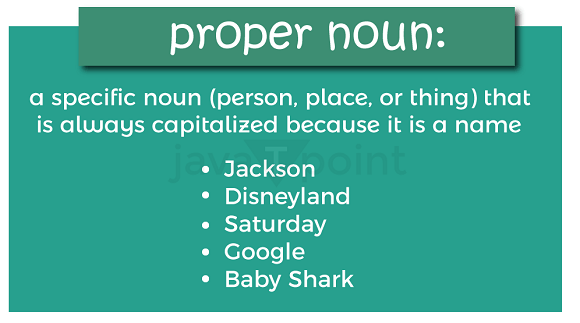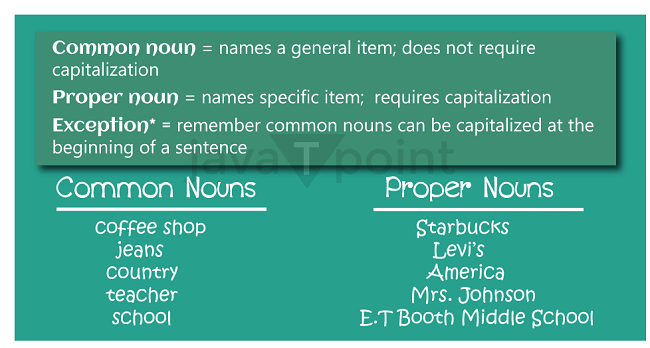Proper Noun Definition and ExamplesNoun can be of two kinds: proper nouns and common nouns. Proper nouns, in contrast to common nouns, are name words that are utilized to characterize or classify a specific individual, place, or thing. Make sure that you always begin a proper noun with a capital letter. 
What Exactly Is a Proper Noun?A proper noun is a kind of noun that can be utilized to imply to a specific person, place, day, month, language, nationality, historical events, major eras and periods of time, or specific brands. Proper nouns have two distinct characteristics: they name specific one-of-a-kind entities, and they always begin with capital letters, regardless of where they appear in a phrase. Here, we'll look more closely at proper nouns, and proper noun examples, and teach you how to use a proper noun correctly. Also always remember that nouns are words that name people, animals, places, things, and concepts. Every noun is further classed as common or appropriate. The contrast is pretty clear once you see some examples and think of a few of your own. Definitions of Proper NounProper Noun has been defined by various dictionaries. Let us have a look at the definition of Proper noun by some of these;
Examples of Proper NounLet us have a look at some common examples of Proper Noun;

How To Differentiate Between Proper Nouns From Common Nouns?You might be asking how to tell the difference between proper nouns and common nouns. It is extremely simple and straightforward to distinguish the both nouns. The key thing to remember is that common nouns are fairly generic in character, and there are many items of the same sort. For instance, a pencil, a book, a bicycle, a key, and so on. Proper nouns, on the other hand, refer to all things that can be found to be particular, and there is no way you could have another one of the same sort. There is only one Michael Jackson, one Abraham Lincoln, one Brooklyn, one Bangalore, and so on. Let us have a look at a few sentences with both proper noun and common noun. For instance;
(Here Binto and Selina are Proper noun whereas cat is a common noun)
(Rhea and Delhi High School are proper noun and accountant is a common noun)
(boyfriend is a common noun and Rohan is a proper noun)
Proper Nouns: How to Use ThemProper nouns are simple to put into practice if you know what they are. Simply use them in statements as you would use common nouns and make sure to capitalize them. Here are some examples to get you started. Brett had anticipated for an easy mathematics teacher, but Ms. Hodges' strict requirements and quick anger temperament made the semester unpleasant. → The word "teacher" is a common noun. Ms. Hodges is a formal noun. Rosa had a cake desire, and not just any cake. She went shopping and bought a cake of Truffle. → Cake is a common noun. The word Truffle is a proper noun. We wanted to try some new eatery, so we went to Moti Mahal. The word "eatery" is a common noun. Moti Mahal is a proper noun. Articles with Proper NounsProper nouns, unlike common nouns, are frequently unaccompanied by any articles or determiners. For instance, to refer to someone named Suzan, you would say "Suzan," not "the Suzan," "a Suzan," or "that Suzan." There are, however, exceptions to this rule. Certain countries' and organizations' names are prefixed by a definite article ("the"); these are names that are partly made up of common nouns, like "republic" or "association." The article alone is not capitalized. Proper Nouns Containing Definite ArticlesLet us have a look at few examples;
Furthermore, some proper nouns are consistently pluralized, and they are usually followed by a definite article (which is not capitalized). Pluralized proper nouns ExamplesMany mountaineers wish to visit the Himalayas. The Troubles disturbed life in the north of Ireland throughout the latter part of the 20th century. It's also feasible to treat proper nouns more like common nouns, such as referring to multiple people or objects with the same name jointly or distinguishing between them. Articles, determiners, adjectives, and pluralization are employed in the same way as they are for common nouns. Proper Nouns Handled As Common NounsLet us have a look at few examples
Nouns Can Be Common Or ProperWhen utilized as (part of) the name of a certain person with that job, several common nouns denoting roles turn proper. Words for family duties, for instance, are capitalized only when utilized in a similar way as names (all without articles or the determiners). Examples include the capitalization of family roles.
Nouns that serve as titles (for example, political, religious, or professional names) are written with capitals only when they appear as a component of the name of a certain person who holds that title. 
Job And Title CapitalizationLet us have a look at few examples of this;
The fundamental directions (compass directions north, east, south, and west) are considered common nouns. However, they are capitalized when they are part of the title of a specific location or region, or when utilized in a political or cultural context. Capitalization Of Cardinal DirectionsLet us have a look at examples of this;
The world split into two opposing political groups during the Cold War: East and West. Proper AdjectivesProper adjectives are adjectives that derive from proper nouns and are consequently capitalized. These are frequently words denoting a particular nationality, language, or ethnic group (for example, "Dutch") or words that originate in a person's name (for example, "Michael"). Proper Adjectives ExamplesLet us have a look at examples of this;
Capitalization RulesWhen you speak, your tone of voice, voice modulation, pauses, and word pronunciation are all important. Only in written communication does the requirement of capitalization for proper nouns apply. People will sometimes utilize capital letters to emphasize what they are saying. It has not been made any easier by the modern communications system. When people, especially teenagers, send messages to one another, they have a propensity of capitalizing the entire word or sentence and adding an excessive number of exclamation points or question marks to indicate tension and significance. As an example, I need you to return home RIGHT NOW!!! WHERE HAVE YOU GONE???? This type of behavior has influenced how people write, even for educational and professional objectives. When writing for academic or business purposes, there are specific capitalization standards that you should follow. The following guidelines will help you improve the readability of your work. 1. Only capitalize directions such as east, west, north, and south if they are part of a place's name. For example, the Western Ghat portion is rather peaceful. If you head north, you'll find what you're looking for. 2. Only capitalize relationships when they are used as a name to refer to a specific person. For instance, did you know your Dad won a lottery prize? Is your mother joining us on this trip? 3. Days and months should always be capitalized. For example: Will you be returning home on Wednesday? Without a doubt, schools are going to resume in June. 4. Seasons, on the other hand, are not need to be capitalized. Seasons, like relationships, can only be capitalized when they are part of a formal name. For example, I'd love to go to Canada in springtime. 'The Autumn Leaf' is a compilation of poems by various authors. 5. The same criterion applies to occupations and job titles. Only while introducing or addressing somebody can you use capital letters to begin a profession or job title. As an example: Narendra Modi, the prime minister of India, started the Republic Day happenings by hoisting the national flag. I'd want to thank our principle, Mr. Samantha Sharma, for his ongoing support and guidance. 6. Nationalities and nations should always be capitalized since they are proper nouns that are used to identify a certain location, race, or group of people. As an example: My brother is planning an office trip to both Malaysia and Singapore in the near future. The British governed India for almost 200 years. 7. Brand names must always be capitalized because they pertain to specific brands. For instance, He requested that his mother purchase him Adidas footwear. Have you seen my shoes? (common noun) 8. Languages must always be capitalized because they are proper nouns. A language may have several dialects, but the underlying language stays the same. For example, the English language has many dialects, including British English, American English, Indian English, Canadian English, and Australian English. For instance, I am fluent in four dialects: English, Hindi, Tamil, and Malayalam. Is Persian the sole language spoken in Persia? 9. Events of significance to history, eras, and periods are capitalized, but decades are not. For example, British India was a period of scientific and educational advancement. The Great Indian Revolt of 1857 was the most effective and influential liberation movement. The Elizabethan era was a golden age for all forms of creativity, music, building design, and poetry. Do you live in the twenty-first century? Key Points To Remember While Using Proper NounHere are five common problems with proper nouns and capital letters. (Issue 1) Do not capitalize a word simply because it is a vital word in your sentence, phrase or paragraph. A proper noun is represented with a capital letter since it is a name or title. Do not capitalize a word simply because it is an essential term in your phrase. You have been chosen as a valuable Client for a unique Reward. incorrect cross (Because "client" and "reward" are common nouns, they should not be capitalized.) (Issue 2) Only capitalize the most important terms in a title. When writing a name or a title, it is usual practice to use capital letters exclusively for the key words. This is known as title case. Except for articles (i.e., "a," "an," "the"), conjunctions, which are (e.g., "and," "but," "or"), and prepositions (e.g., "on," "in," "with"), all words are primary words. Here are a couple such instances:
(If a non-principal word begins the title, it gains a capital letter.) Leonardo da Vinci and Ludwig van Beethoven are two composers who have contributed to the history of music. (Title case is frequently used with foreigner names, but not always, as in Din Vun Dike. It relies on how the persons wrote it.) (Issue 3) Do not use uppercase letters for seasons (e.g., "winter") or directions of the compass (e.g., "south"). The titles of the seasons and the coordinates of the compass points are not proper nouns. They are written entirely in lowercase letters. Some geese migrate southward for the winter in the fall. This is correct. (Issue 4) The Sun and Moon should be written in capital letters. The moon that orbits the earth is known as the Moon, while our sun is known as the Sun. Use capital letters when alluding to the Earth's moon and our sun in particular. A solar eclipse happens when the Moon completely or partially obscures the Sun.- Correct (Most of the time, "Moon" and "Sun" (in capital letters) have to be preceded by "the.") (Issue 5) Capitalize phrases like Chairman and Finance Division if they refer to certain people or departments. When referring to certain people or offices, use job titles and office titles (e.g., "Director" and "The Financial Sector Department") as proper nouns; if not, utilize lowercase letters. When such terms are prefixed by "the," they usually allude to specific people or offices. The Prime Minister has the best legs of any Prime Minister. Correct Do you serve in the HR Department? I had no idea we had a human-resources department. Correct Thus, Proper Nouns are an important part of English Grammar. These are names of specific name, animals or objects or place. Moreover, they are always capitalized irrespective of their place and position in the sentence. However, at the same time abuse of capitalization should be checked and must be used as per their rules.
Next TopicMonarchy Definition
|
 For Videos Join Our Youtube Channel: Join Now
For Videos Join Our Youtube Channel: Join Now
Feedback
- Send your Feedback to [email protected]
Help Others, Please Share










